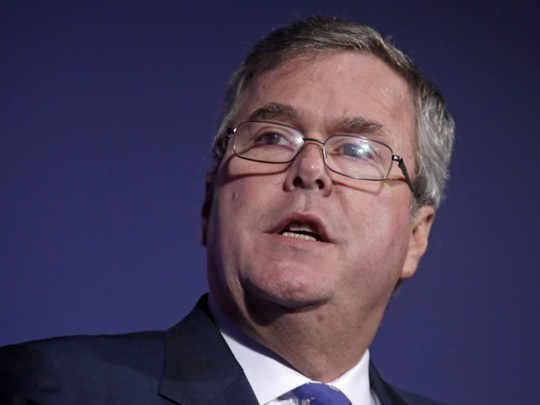
Jeb Bush could be the most unusual of presidential candidates: Both a front-runner and an underdog. Perhaps that explains the former Florida governor’s unexpected announcement on Tuesday that he will actively explore a presidential candidacy. That he will do so came as no real surprise, given all he’s said and done in the past few weeks. It’s been clear for some time that he was already actively exploring. That he felt the need to let the world know in such an explicit way before the holidays suggested he understands what comes with his unique position in the GOP field.
The immediate analyses of Bush’s announcement — which was posted on Facebook, a sign of his recognition of the importance of social media in today’s politics — focused on what this will mean for other prospective candidates, like fellow Floridian Marco Rubio, the freshman senator who might have been the more likely of the two to move early, given his limited national prominence and his need to build a solid fundraising network.
Or Chris Christie, the New Jersey governor who has spent the past year courting big-time Republican donors in anticipation of a presidential run in 2016. Christie and Bush will be after many of the same people as they raise the money needed to sustain a presidential campaign through what is expected to be a competitive and unpredictable nomination contest.
They are just two of a dozen or so Republicans who are now feeling the rumbles set off by Bush’s announcement. Every candidate claims that the decisions of others will have no impact on their own decision — as Wisconsin Governor Scott Walker told reporters in his home state shortly after the Bush news broke last Tuesday. But all certainly are rethinking their own situations — not necessarily whether they will run, but what it will mean to have a Republican named Bush in the race, and a Bush who seems to be deliberately incautious right now in the moves he’s making.
Bush will be dubbed the nominal front-runner for two reasons.
First, in the absence of Mitt Romney, he becomes the leader in early polls of Republicans’ preferences. Those polls ought to be taken for what they’re worth, which is not much.
That he stands atop the latest Washington Post-ABC News poll (again, if Romney is removed from the field) says little. His numbers — 15 per cent among all adults; 14 per cent among registered voters — hardly qualify for front-runner status.
In this survey, he is ahead of Representative Paul Ryan, the 2012 vice presidential nominee, by a margin-of-error difference. At 14 per cent, he’s well below what even Romney was getting four years ago at this early stage, and Romney was considered a fragile front-runner because of resistance on the right. What does that make Bush?
He’s the front-runner as well because, presumably, he can tap into significant amounts of establishment Republican money.
‘Pay to play’ rule
In fundraising, however, Bush will have one potentially significant advantage over the many sitting governors who are looking at running. They are all affected in one way or another by what is known as the “pay to play” rule. This is a Securities and Exchange Commission regulation that prohibits financial institutions whose employees contribute to candidates from doing bond business in those states. It has made those institutions extremely cautious about political contributions to governors.
Bush is not the kind of front-runner that his brother, former president George W. Bush, was when he ran in 2000. In that campaign, the then-Texas governor was able to consolidate support early in 1999 among his fellow governors and their support vaulted him to the top of the field.
Yet Matthew Dowd, who was a key strategist in both of Bush’s presidential campaigns, last Wednesday noted on Twitter: “Reminder folks: last Bush to run was 40 points ahead, outraised everyone at least 5 to 1, had every endorsement, & nearly lost the nomination.” And that was at a time when the Bush brand was considered a major asset. Today it is more mixed.
Jeb Bush is smart enough to know all this, which may be why he’s doing what he’s doing. The normal script for a presumed front-runner is to hang back, to wait, to let the opposition make the first moves, to play it safe, to avoid engagement as long as possible. Bush is doing the opposite right now.
His detractors see Bush as a conservative imposter, another establishment Republican who will run an ideologically tepid general election campaign. Bush will get a preliminary reading on that sentiment with his announcement of active exploration. But only if he takes the full step into a campaign will he learn whether those attitudes are widespread in the Republican base.
So there are obstacles facing Bush in both the Republican primaries and caucuses and, if he successfully makes his way through that thicket, in a general election. It’s no wonder adopting anything that seems like a true front-runner’s posture could doom his chances.
The question is whether he can take advantage of his establishment support without letting it encumber his candidacy. Can he be both Bush and non-Bush? Can he be a candidate for the future and not a legacy candidate out to extend a political dynasty in a possible race against former US secretary of state Hillary Rodham Clinton? Can he really take the risks he’ll probably need to take to make himself the strongest possible candidate?
Until Bush shifts from actively exploring to genuinely pursuing the presidency, these questions will await answers. He is neither a clear front-runner nor a true underdog. But in one way or another, he will have to be both if he hopes to succeed his father and brother in the White House.
Washington Post










